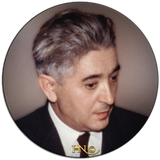Jacques Hnizdovsky was born to an aristocratic family in the village of Pylypcze, Ternopil Oblast, Ukraine, the grandson of a Count on his father's side. This was to harm the family under the Soviet occupation and led to the confiscation of all their lands, their estate, and forced Siberian exile for the family. The caretaker's cottage that they were forced to live in, was the only home Hnizdovsky remembers. He likened it to a subway car.
Hnizdovsky spent his childhood in Ukraine, mostly at boarding school in Chortkiv, and at Seminary in Lviv. At the urging, and with the full support of Metropolitan Andrey Sheptytsky, Hnizdovsky left Ukraine to study at the Academy of Fine Arts in Warsaw. This support was provided him, not only because of his artistic talent, but to protect him from certain Siberian exile. Hnizdovsky would never see his parents again, and in his lifetime, never even had a chance to speak with his mother or siblings, since the former Soviet Union only dissolved after his death in 1985. Letters to him from his siblings were severely censored, redacted, the majority of them being covered in black blocks of ink.
Hnizdovsky's studies were abruptly cut short when Nazi Germany invaded Poland. He escaped Warsaw by foot and by stowing away in trains. He fled to Yugoslavia, where he was able to complete his studies at the Academy of Fine Arts in Zagreb, on full scholarship, receiving credit for the two semesters he completed in Warsaw.

Jacques Hnizdovsky's parents with his two older brothers. This photo was taken in 1905 in Pylypcze, ten years before Jacques Hnizdovsky was born.

Jacques Hnizdovsky at age 5 (1920), the year he started drawing. His most treasured possession was his double ended, two-colored pencil.

Jacques Hnizdovsky at the Chortkiv Gymnasium (front row, left). Hnizdovsky never completed his studies at Chortkiv, and transferred to Seminary in Lviv, where he completed his secondary studies, before heading to the Academy of Fine Arts in Warsaw.

Hnizdovsky (front row, left) in front of the Ivan Franko Memorial at the historic Lychakivsky Cemetery in Lviv, Ukraine. Hnizdovsky's gaze is fixed towards the location of his own final resting place, directly opposite the tomb of Ivan Franko.




